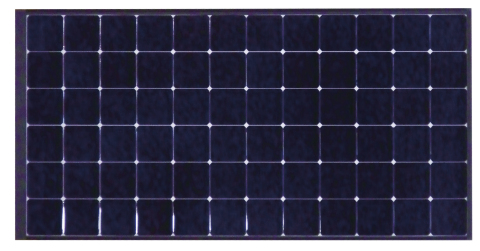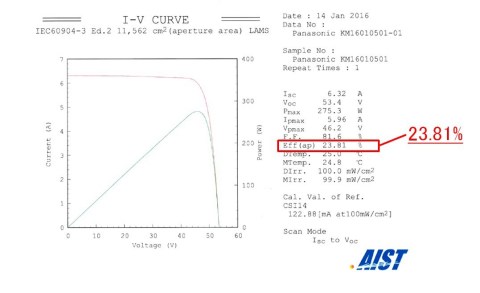OSAKA, Japan--(BUSINESS WIRE)--Panasonic Corporation today announced that it has achieved a photovoltaic module conversion efficiency of 23.8% (aperture area*3: 11,562 cm2) at research level, a major increase over the previous world record for crystalline silicon-based photovoltaic modules.
The previous record for the conversion efficiency of a crystalline silicon-based photovoltaic module was 22.8% *4. Panasonic has broken the record for the world highest conversion efficiency by a full percentage point. Panasonic had announced a world’s highest conversion efficiency of 25.6%*4 in its silicon heterojunction cells in April 2014. Herewith, Panasonic holds the world records of conversion efficiency for both crystalline silicon-based solar cells and modules.
Panasonic developed a unique silicon heterojunction structure*5 composed of crystalline silicon substrate and amorphous silicon layers, and has continuously improved its photovoltaic module HITTM using silicon heterojunction since the start of commercial production. This new record was achieved by further development of Panasonic's proprietary heterojunction technology for high-efficiency solar cells and modules adopting a back-contact solar cell structure*6.
Going forward, Panasonic will continue to pursue technology development of its photovoltaic module HITTM, aimed at realizing higher efficiency, higher reliability and lower costs, and will work towards mass production.
*HIT is a trademark of the Panasonic Group.
*1 According to research by Panasonic as of February 18, 2016, for
crystalline silicon photovoltaic modules.
*2 Result of evaluations
at the National Institute of Advanced Industrial Science and Technology
(AIST).
*3 The module area is the aperture area opened by the masks
(11,562 cm2).
*4 SunPower (USA) November, 2015. Judged
from the "Solar cell efficiency tables (version 47)" [Prog. Photovolt:
Res. Appl. 2016; 24:3-11]
*5 Technology for junction formation
required for solar cells that covers the silicon base surface with an
amorphous silicon layer. This technology has the key feature of superior
passivation to compensate for the many flaws around the silicon base
surface area.
*6 Technology for eliminating the shadow loss on the
front side electrode with the electrodes on the back of the solar cell,
which allows the more efficient utilization of sunlight.
About Panasonic
Panasonic
Corporation is a worldwide leader in the development of diverse
electronics technologies and solutions for customers in the consumer
electronics, housing, automotive, enterprise solutions and device
industries. Since its founding in 1918, the company has expanded
globally and now operates 468 subsidiaries and 94 associated companies
worldwide, recording consolidated net sales of 7.715 trillion yen for
the year ended March 31, 2015. Committed to pursuing new value through
innovation across divisional lines, the company uses its technologies to
create a better life and a better world for its customers. To learn more
about Panasonic: http://www.panasonic.com/global
Related Links:
Panasonic Solar Global
http://panasonic.net/ecosolutions/solar/





